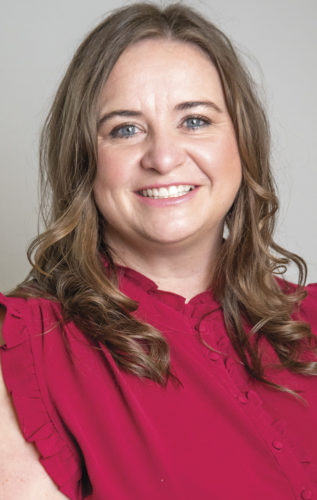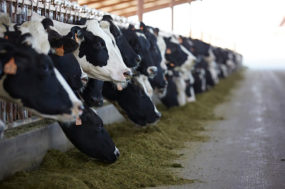In April 2024, four McGill University students from the Macdonald College’s Farm Management and Technology (FMT) program participated in the 2024 North American Intercollegiate Dairy Challenge (NAIDC). Beatrice Neveu, Connor Velthuis, David Kolton Crack, Jason McOuat and their coach, McGill Faculty Lecturer Mathieu Leduc, traveled to California for this three-day event to sharpen their dairy and business skills while networking with teams from across North America.
Progressive Dairy editor Lora Bender had the opportunity to interview Neveu (21), from Ferme Rejemas 2014 Inc. in Rawdon, Quebec, and Velthuis (20) from Velthuis Farms Ltd. in Osgoode, Ontario, about their experience and goals as future leaders in the dairy industry.
What was your experience at NAIDC and how did your team prepare for the event?
NEVEU: NAIDC is a competition where university students participate in analyzing the financial and technical aspects of a dairy farm and then coming up with a management plan to improve weaknesses identified on the farm. The competition hosted over 125 students from more than 31 teams from across North America. With a busy school schedule, we didn't have a lot of preparation for this competition, but went with the goal of learning, networking and taking in the enriching experience together, which was amazing.
The preparation we had consisted of our classes through our three-year program at Macdonald College, the Dairy Academy that we had the chance to participate in the spring of 2022, as well as the regional competition that we participated in the fall of 2023. We also got the opportunity to brush up on our knowledge of finances during a hands-on activity at Miner Institute in the state of New York. Through the networking periods of the competition, we met a lot of people, and we really got to see things from a different angle.
VELTHUIS: Once we got to the conference centre, we were given information about the NAIDC process and farm production information, benchmarks, financial data, feed rations and DairyComp backup files for analysis. The next day, we visited the farm and had a few hours to wander the farm to see firsthand how the business was running. We could look at calf housing, how the parlour was running, feeding systems, housing, anything we wanted, while taking pictures. Upon return, we worked together to form our ideas and develop a PowerPoint presentation with our recommendations to present the next day during a 20-minute presentation to a panel of judges. On the final day, we had a banquet where the judges presented their placings and reasons.
Networking was one of my favourite parts of the event. By the time I got to the national event in California, I already knew a ton of people from the prior academy events in Saratoga Springs, New York, and the Northeast regional challenge in Harrisburg, Pennsylvania. It was great to reconnect and I found it interesting to hear different perspectives from young people across the continent from farms of all sizes.
What was your biggest takeaway from the experience and how do you think it will influence your future career in the dairy industry?
NEVEU: My biggest takeaway is just how important networking is – it's important to have those conversations and discuss the parts of the industry that you don't understand or don’t agree with as well. I think this will really influence my future career by making sure I get out to networking activities and participate in local events in my area to get to know people to ensure I have resources if ever I need help in certain aspects of the industry in the future.
VELTHUIS: My biggest takeaway was that it gave me a close look at how different farms are across the continent. They have widely different challenges in California as opposed to us, such as the Water Resource Board hindering growth to the constant importing of feedstuffs. We do things differently at home as compared to our neighbours, to someone in southern Ontario, to someone in the U.S. The whole trip was simply eye-opening at how many ways there are to achieve a common goal of producing milk.
What were some of the key challenges you and your team faced during the competition?
NEVEU: The main challenge we faced during this competition was how deep we had to dig to find an issue with this farm that just excelled in the domain. Our team was very impressed to see a farm of this scale milking over 5,500 animals and having the performance that everybody wishes to have.
VELTHUIS: Farms are mind-bogglingly huge in California – where [according to DFC] the average herd size in Ontario and Quebec is 75 to 95 cows, the average for California farms is around 2,000. Everything is to great scale, and for a team from comparatively small herds, it was simply a lot to wrap your head around. Trying to implement changes for the farm had to make sense for their situation. Our team had to make sure we didn’t tell them they should make more milk if their processor is on a base system, for example.
What specific strategies or knowledge did you bring back from the challenge that you plan to implement in your studies or future work?
NEVEU: One key takeaway I'll bring back to my farm is the importance of consistent and strict implementation of protocols. If they're taught and structured well enough, they will work to ensure everything will be done properly, helping reach your goals – no matter the size of farm or the number of employees you have.
VELTHUIS: One of the bigger ones would be working in a team. To get anything done, we had to just bounce ideas off each other – no matter how strange an idea may sound, with a few tweaks from the team, perhaps it is something of use. Nothing gets done if you don’t say anything, so say it. Also, learning to look at problems with a different lens; for example, U.S. producers must be very cost-conscious and extremely efficient with such thin margins, so why not apply a similar thought process to a project at the home farm?
Where do you see yourselves in the next five to 10 years within the dairy industry?
NEVEU: In the next five to 10 years, I see myself being a major shareholder in our family farm.
VELTHUIS: Now that I have since graduated from Macdonald College (spring 2024), I’ve returned to the family farm, full time, joining my father, uncle and cousin. In five to 10 years, my two younger brothers will also return from school and the plan right now is for the four of us to expand and take over the farm from our parents We are the third generation on the farm.
How do you see the future of the dairy industry?
NEVEU: The future of the dairy industry is a challenging one. I can see the dairy industry holding on to the supply management system, allowing dairy farmers to continue to re-invest with confidence in their enterprises. With re-investment comes sustainable practices, so I see the industry becoming even more eco-friendly than it already is, by implementing more precision ag into the business. My biggest hope for the future of the dairy industry is to see the demand for our local quality milk increase, thanks to keeping the market local which would allow our Canadian dairies to increase in scale within a more efficient time frame.
VELTHUIS: The future looks bright for our industry. Young people are still engaged in industry youth events, in their family farms and their communities. Farm succession planning has seen great improvement regarding programs and other resources to promote and ensure smooth generational transitions. Demand is steady, we still get incentive days, and DFC/DFO does a good job marketing the products of our sector – overall, we should be all right.
What advice would you give future dairy enthusiasts considering studying agriculture and/or participating in NAIDC one day?
NEVEU: Do it! It's an amazing industry to be a part of, there's so many different opportunities within the dairy industry and the agricultural industry in general. If that's the passion that drives you, there are no regrets to be had. Not only is NAIDC an excellent way to network, but it's an efficient way to learn about different aspects of the dairy industry. Participants are passionate and have so many different angles of seeing things – it's interesting to learn together and absorb everything that can be absorbed.
VELTHUIS: If you are considering studying agriculture, just do it. There are so many opportunities in this industry. From farm management to nutrition, agronomy, veterinarians and countless more titles – it takes an army to make this industry work smoothly, and there is a spot for you in this industry somewhere. If not for the topic of study, the people I’ve met in these programs are some of my best friends for life.
If you have the chance to go for the NAIDC, go for it. There’s a world of experience out there, and the industry is very different across the continent. If for nothing else, it is an amazing trip to view some well-run farms at great scale and meet new people while learning from some of the best industry professionals.








